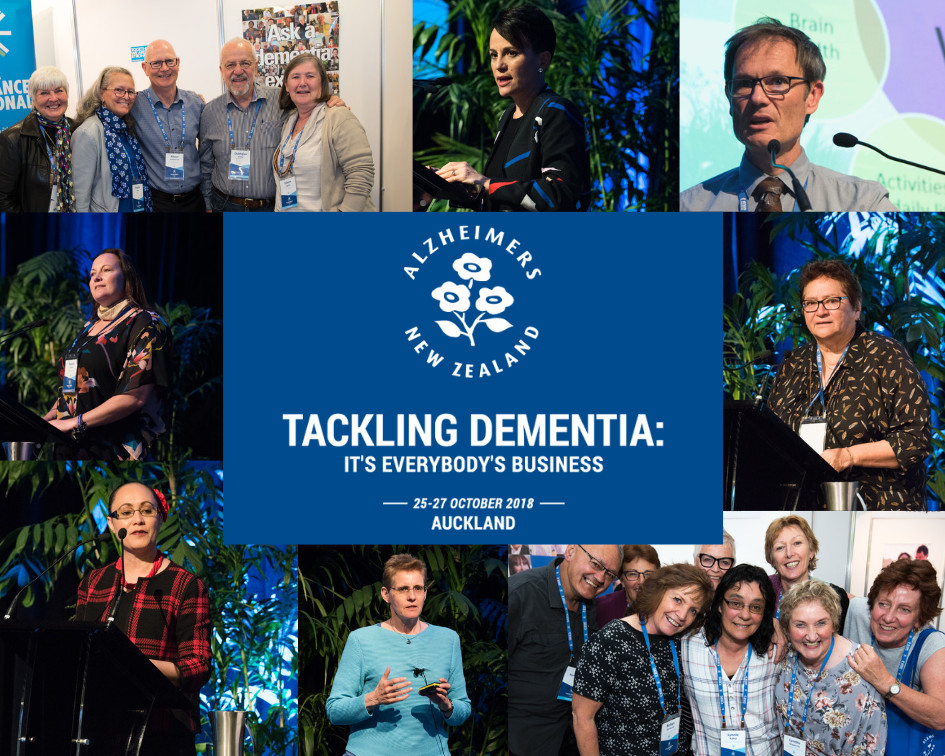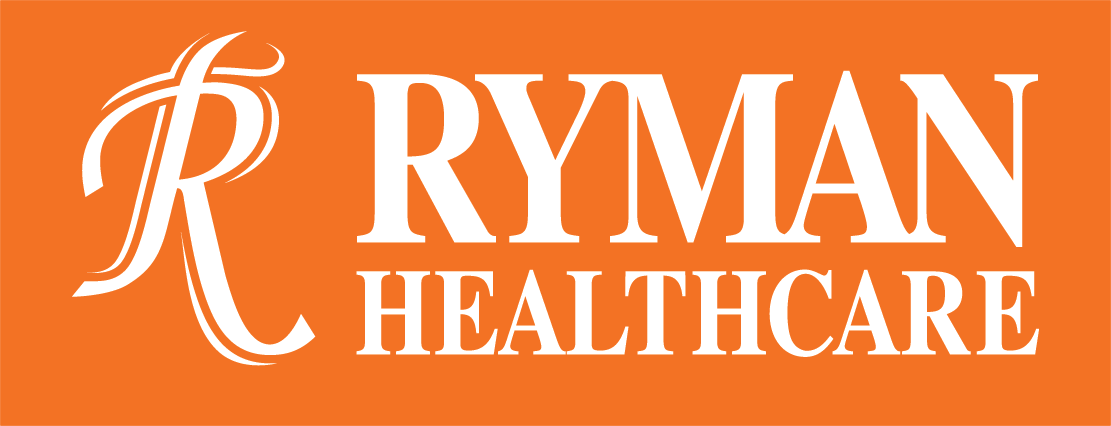2018 Conference
Tackling dementia is everybody’s business, Mā wai e āwhina te mate wareware - mā tātou katoa.

This was the universal message of the diverse discussions at the 2018 Alzheimers NZ Conference, which took place over the 25-27th October 2018 in Auckland.
We were joined by 300 delegates, 30% of which were people living with dementia and care partners, who attended the conference free of charge.
We gratefully acknowledge the support of our sponsors who have helped make the conference possible.
The thought provoking conversations that took place over the course of the 3 days demonstrated stronger than ever that it’s up to all of us to do more and better for people living with dementia.
You told us:
“Thank you for the opportunity to speak in New Zealand. It was an amazing conference. Well put together with very pertinent topics. The hospitality and support given to all was greatly appreciated.”
“I so enjoyed the conference. It was interesting and often very moving. I spoke to many people who had fascinating stories, valuable insights etc. and I learned a lot.”
“I thought the themes for the days were excellent. Loved the focus on the voice of people with dementia.”
“I was enthused by the quality of speakers and the quality of network interactions with a broad sweep of professionals and consumers who I would never normally meet.”
“Well done for such an inclusive and stimulating event.”
Read the full report day by day below
The first day of the Conference had a strong focus on human rights. After a formal welcome from Ngati Whatua and Alzheimers NZ Patron Sir Richard Faull, Alzheimers NZ Chair Ngaire Dixon took the opportunity to reflect on the ‘State of the Nation’. The answer, it seemed, was pretty atrocious.
“Successive government have dropped the ball when it comes to tackling the dementia issue. People living with dementia are currently being let down by a system that is marginalising them – services for people living with dementia are inadequate, delivered inconsistently across the country, and they are of variable quality.”
In the opening plenary session, we heard from Phyllis Fehr from Dementia Alliance International, who reflected on her own dementia journey and the importance of citizenship. Phyllis urged us all to take human rights from rhetoric to reality.
“It’s time to stand up for our rights and not allow them to put people living with dementia in a corner anymore.”
NZ Disability Rights Commissioner Paula Tesoriero spoke next about supported decision making, putting choice, control and autonomy at the forefront. Paula’s final message to us was, “Take the time to listen.”
The power of listening formed a strong basis of Bobby Redman and Lee-Fay Low’s presentation about post-diagnostic support. Lee-Fay and Bobby are currently working together on the pilot Dementia Lifestyle Coach study, which combines counselling, coaching and peer support for people recently diagnosed with dementia to prescribe ongoing engagement in life. Bobby reflected on the empowerment that came with being a peer supporter, saying the programme had given her purpose and confidence.
David King from Platinum sponsor Ryman Healthcare told us a little bit about the Ryman Prize, which is an annual award for the world’s best development, advance or achievement that enhances quality of life for older people. This year’s winner was artificial intelligence and robotics pioneer Professor Takanori Shibata.
Alison Wray challenged us all to be more flexible and supportive in how we communicate with people living with dementia. Her presentation highlighted how opportunities to connect are often missed by our misinterpretations of intention and shared meanings.
Catherine Hall, CEO of Alzheimers NZ, reflected next on the progress being made nationally to tackle dementia, and on the shift in thinking to the sorts of rights based discussions that been happening during the day. While little has been happening politically, Catherine was optimistic about the growing activist voice and focus on human rights, which had both been driven by people with dementia.
“Too often the choices, preferences, needs, and rights of people living with dementia are overlooked or ignored. It is time to lift our gaze to choice and dignity in the ways we live with dementia.”
Peter Boshier, NZ Chief Ombudsman, concluded Thursday’s programme by talking about their recently extended health and disability mandate, which now covers privately run aged care facilities where individuals are detained without choice. Peter felt encouraged by the human rights focus of the day’s discussions and was looking forward to getting underway with the plans and start making a proactive difference in the sector.
“We are evolving, maturing and changing. We are a place people can go when they feel they have been let down by everyone else.”
Following a busy afternoon of concurrent sessions, we were pleased to catch up with Conference delegates and some of our local Dementia Friends and supporters at our networking function.
Alister Robertson, Board member of Alzheimers NZ and Dementia Alliance International, opened the second day of the Conference by introducing us all to what it means to live well following a diagnosis of dementia.
“In many respects, today is for us. We have a wide range of topics and speakers focussed on the things that can and do help us live our best possible lives with independence and dignity.”
Phil Wood and Lynette Tippett from Brain Research New Zealand began by updating us on the current direction of dementia research. While encouraging studies were underway, they issued a caution against the ‘magic bullet’ headlines we see so often in the media.
“Dementia is most likely caused by multiple factors, there is no single cause, so there is unlikely to be a single cure.”
In the meantime, Lynette suggested that we all focus on lifestyle changes we can adopt to help us reduce our risk of developing dementia, or live well with a diagnosis of dementia. Essentially, this meant doing everything we can to keep our hearts healthy. How we do this however, did not work on a ‘one size fits all’ basis. It was up to us to find physical and social activities that work for us as individuals.
Indeed, as Matthew Croucher stated in the next session:
“A purely medical approach to dementia support is not enough. We need to focus on personhood, the collection of those qualities that make us a unique person in our own eyes and in the eyes of others.”
Following a wonderful performance by the CeleBRation Choir, we started our discussions on how we might approach living well with dementia, beginning with diet. Carol Wham explained that there is good evidence to support the benefits of the Mediterranean diet, which is plant and non-refined cereals based, low in processed foods, red meat and dairy.
Julie Cummins then challenged us to change the way we think about exercise, and find something that we enjoy and works for us. Above all, Julie urged us to move a little bit more and make our hearts stronger.
Enjoyment was also a focus of Gary Cheung’s discussion of the benefits of Cognitive Stimulation Therapy (CST), which aims to actively stimulate and engage people with dementia, whilst providing a positive social environment in a group setting.
“CST is about fun. Make time for the cognitively stimulating activities that you’ve always enjoyed. And then try adding something new. Generate some mental sweat!”
Associate Health Minister Jenny Salesa made an emotional address to delegates, reflecting on her own family’s dementia journey.
“The health system must be ready to support the ageing population. We need to be proactive, flexible and improve equity. Services need to be culturally relevant and respond to people’s needs.”
Matthew Croucher commended the Minister on her words and urged her to bring the issue to the political table as a matter of urgency.
Discussions about living well with dementia resumed with Chris Perkins reflecting spirituality and how this might be affected by dementia, noting that spirituality is not just about religion, but also about connectedness, arts, nature, religion and place.
Oleg Kiriaev picked up on some of previous discussions around communication by reiterating the importance of approaching difficult conversations with an open mind.
“Fears, losses and uncertainties can make conversations difficult, and are often compounded by our responses. Often it’s the way things are said, or what not has been said, that’s important.”
Saturday morning’s concurrent sessions were followed by a much anticipated presentation from Margaret Dudley on Kaumātuatanga o te Roro, a Māori approach to the management and treatment of mate wareware (dementia).
The overall aim of Margaret’s research is to develop a kaupapa Māori theory of dementia, and to use that knowledge to inform the development of a Māori responsive assessment tool for the diagnosis of dementia, and an app to support care partners.
Margaret told us that diagnostic tools and support services currently offered were often not culturally relevant for Māori. This point was also made by other speakers during the conference, who were also researching the lived experience of dementia in NZ’s Pasifika and Indian communities.
All researchers in this area concluded that this sort of first-hand qualitative data was vital in understanding how we can better support people affected by dementia.
Liz Smith and Jean Gilmour told us next about the lived experience research they are currently undertaking as a partnership between Alzheimers NZ and Litmus, and about the importance of inclusivity.
“Traditional research processes can silence voices. Lived experience research involves people with dementia at all stages and values their voices. We strongly feel that people with dementia have the same right to contribute to research as everybody else.”
For the final session of the Conference, a panel discussion took place to discuss how technology can help support people with dementia.
Maree McCabe told us about Dementia Australia’s virtual reality technologies, which were helping people to understand a little bit more about what it is like to live with dementia.
Richard Reid introduced us to kin2kin, a family based social media app, which allows closer connections between the generations. We then heard a little more about supportive technology from Sam Johnson from MyCare, which connects up clients and health and care professionals, and Matt Hector-Taylor from BeSure, a home safety monitoring system.
All these technologies had one overall aim in common. They were starting to reflect a world of choice, flexibility and social connectivity.


